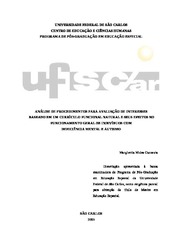Análise de procedimentos para avaliação de interesses baseado em um currículo funcional natural e seus efeitos no funcionamento geral de indivíduos com deficiência mental e autismo.
Resumo
Evaluation or teaching programs that emphasize the student s difficulties indicate to the educators which developmental areas are presenting deficits and where to invest for the recovering of these students. The current Educational Policies and the new conception of mental deficiency state guidelines about the inclusion of the handicapped individuals in common spaces and call for the reflection of the use of educative practices with the vision centered in the person as a subject that has desires. This demands from the educators the exercise of looking at student s abilities, and educating him/her in real environments in order to allow them to live in real environments. In this study, it was investigated the effects of the Natural Functional Curriculum application in: (a) student s interests in the acquisition of the proposed abilities; (b) the change of the interests and abilities repertoire; (c) individual s general functioning; (e) student s generalization at home; and (f) the learning maintenance. The Study started from an evaluation centered in the person. Participated in the study two adult persons with Autism and Invasive Developmental Disturbance associated to a Severe Mental Deficiency. The study was realized in the Brazil Ann Sullivan Center R.P .
Initially the level of student s interest and abilities were evaluated. Their performance was
evaluated by an operant baseline (Lbo) and supported baseline (Lba) in daily living activities,
home living and functional academics. Based on this evaluation, an individualized Natural
Functional Curriculum was organized and trained in group and in natural environments. The
data was collected in a period that varied from 33 to 44 weeks. The students were re evaluated
daily for each task and as a whole after four months. A method to evaluate and quantify
student s level of performance and interest was developed through the support needed in real
circumstances. The results show that in both students the interests are associated with the
performance in most of the activities and that in the final general functioning they needed
much less support in relation to their initial performance. It was observed that both
participants had their interest and ability repertoire in the proposed tasks, estimated by Lbo and Lba, increased significantly, and it was generalized in the student's home and maintained upon follow-up. It was concluded that: (a) The proposed method allows to evaluate and to quantify the interests and abilities of severe mentally retarded individuals with
communications deficits and autism; (b) The Functional Natural Curriculum, associated with
the evaluation method developed in this study, is an educational alternative to teach useful
concepts and abilities, if situations such as age, desires, student s capabilities to inform and to
make choices are respected; (c) The operant baseline emphasizes normality and dependency
in a way that minimizes the student potential; (d) The supported baseline, transform the
handicapped in a unique Person and that they are different from others.
